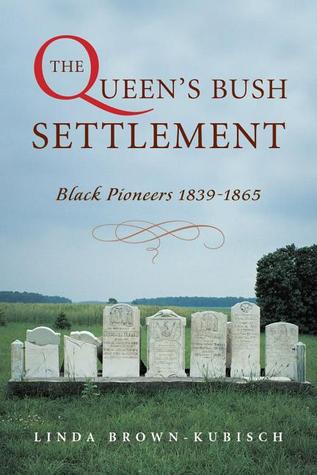
Last year or the year before, I stumbled across the fact that the rural southern Ontario township in which I lived until I was 18 had been the site of a major Black settlement in the mid-19th century. I had no idea, and I suspect the vast majority of people who live there have no idea – a thoroughly ordinary example of the erasure of Black history, such that a space that had been Anishinaabe/Haudenosaunee since forever and which was once home to many Black people is today resolutely constructed as white in feel, imagination, and memory. I mentioned this fact on social media at the time, and a friend responded that she had a book about it – this book – and she was happy to lend it to me.
The Queen’s Bush Settlement was written by a former local librarian, a white woman with training in history and genealogy. It is a book with lots of drawbacks, but one that still managed to be fascinating for me. Though it weaves back and forth between the history of this specific settlement and elements of Black history at the level of Canada West/Ontario or even broader, it is still very much a local history, with all that sometimes implies about the plodding presentation of minute detail and a determinedly unexciting writing style. There are also things to be critical about in terms of its approach to history. For one thing, it frames the history that it examines with scarcely a mention of settler colonialism, let alone an exploration of what it means, and far too much of its contextualization of Black experience in Canada is in the tired “we’re better than the US” frame, for all that at least some of the primary source material it presents later in the book might call that into question. I also think that its approach to reading primary source documents might be somewhat limiting. Not only am I not an expert myself, but I largely haven’t even read the kinds of things I’d need to read to weigh in on this with any confidence. Still, I suspect that approaching some of the primary documents (say, those written by white missionaries who were ministering to Black communities, which is a major set of primary sources for this book) in a way informed by critical race theory might lead to different kinds of evaluation and analysis, which I think would make it stronger.
Despite all of that, I learned a lot. The settlement began in the 1830s, and straddled the boundary between the township where I grew up and the one next door. At its peak, there were several hundred Black households split between the two. The settlement began when the land was unsurveyed, and various mechanisms combined to push Black residents out after the surveying was done, including the cost of the land, their poverty, and various racist machinations by white surveyors and settlers. The Black population had already declined quite drastically by the time the US Civil War ended, and the fairly substantial migration of Black folks in Canada back to the US in subsequent years resulted in the departure of many of the rest. There were a couple of families, I believe largely in the neighbouring township, that persisted into the 20th century, and according to the book the last local Black resident with ties to the original Queen’s Bush Settlement moved away in the 1990s.
Probably of interest to only a select few readers, but very glad I read it!
Originally posted on Scott’s Goodreads.